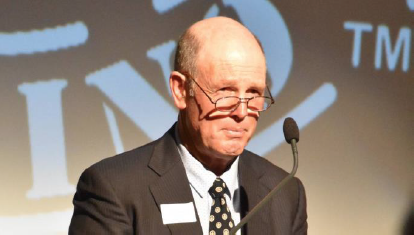Australian Superfine Wool Growers' Association national president Mark Waters says shearer shortages, fly treatments and drench conditions all are challenges for superfine wool growers
/CONFIDENT: ASWGA national president Mark Waters says while there are challenges, fantastic prices sees good time for wool growers.
By Philippe Perez
Updated May 17 2022 - 6:06am, first published May 16 2022 - 6:00pm
A number of leading figures in the superfine wool industry say there is major potential for better quality in wool in the future, but major challenges like work shortages continue to hinder the local industry.
Major industry figures met at 50th anniversary of the Australian Superfine Wool Growers' Association (ASWGA) dinner held in Ararat on Saturday, to discuss the superfine wool industry's future.
The dinner, which was accompanied by farm tours, were normally held annually, but were postponed due to the COVID pandemic.
ASWGA national president of the Mark Waters spoke first at the event, and said the current status of the industry was "very good" with passionate wool growers.
"This is one of our best selling seasons ever [and] lots of fellas are telling me they are averaging well over 2000 cents a kilogram and up towards $100 a head, so that's fantastic," Mr Waters said.
Despite the good outlook he said there are issues that are stymying growth in the wool industry.
"[Along with] shearer shortages, we see drenches and fly treatments that are breaking down... and we need to work with Australian Wool Innovation (AWI) on those sorts of things," he said.
Mr Waters said there were also concerns over land usage.
"We are all fighting for land use, and it is not confined to superfines, if you can make more money out of crops, or cattle... that's where its going to go," he said.
"We are under a lot of pressure from industry advisors to get our sheep bigger, because there is more money in meat, which is fine... but when you're doing that, you're getting a trade off in wool quality."
Chairman of Australian Wool Innovation Jock Laurie also spoke at the event and agreed that there was a lot to be done to address those issues and cited COVID, worms and other pests challenges to overcome.
"Even through the pandemic, up to 92 per cent of our wool was getting traded to China... and while they are still buying wool now, certainly at a domestic level, they are having issues dealing with COVID," he said.
He also said AWI would not waste money in projects that are not timely or beneficial, but was looking forward to catchup growth in the industry and huge training efforts already underway on labour that is based locally or comes from overseas.
"If people come out under a government scheme, we will train them, support them, and get people in sheds," he said.
Mr Laurie also addressed recent criticism from the Australian Workers' Union at the event who said the wool industry was bringing in "cheap overseas labour."
He referenced training thousands of staff already in the industry, and that bringing people from overseas will mean there is still guaranteed training, and would continue to advocate and stand up for wool growers to invest in schemes like Pacific Australian Labour Mobility scheme.
Chair of luxury menswear brand Ermenegildo Zegna, Paolo Zegna was also a guest.
During Mr Zegna's speech, he outlined that his company continued to have a good relationship with Australian superfine wool growers and praised efforts farmers were giving towards sustainability.
"We've followed, and I take the liberty in saying, pre-empted in our case, the increase of consumer interest towards these topics around the world and over the years," Mr Zegna said.
A short video message also came from the Prince of Wales, where he also advocated sustainability.
"Natural materials that are not made from fossil fuels, are not inflammable and which biodegrade naturally have an important part to play as we face up to the enormous challenge of climate change."
"Perhaps we can find better ways to market this extraordinarily practical and versatile fibre and help so many hard-pressed sheep farmers," Prince Charles said.


